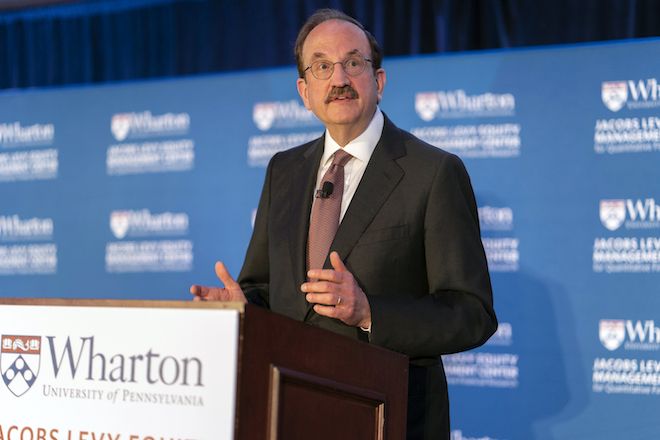
Wharton has announced an $8 million gift from Ph.D. alumnus Dr. Bruce I. Jacobs, which will furnish a new quantitative finance major for MBA students, $25,000 scholarship opportunities for rising second-year MBA students, and a new professorship in quantitative finance. Photo: The Wharton School
The market is a rollercoaster. A major financial crisis looms, only a dozen years after the last one. The world is in economic tumult. What better time to launch a new MBA major to prepare students for a wide range of careers — and convulsions — in the financial services industry?
The Wharton School at the University of Pennsylvania announced today (April 2) the creation of a new quantitative finance major and professorship in the MBA program funded by an $8 million gift by Bruce Jacobs, a Ph.D. alumnus and long-time supporter of the school. The gift includes funding for $25,000 scholarship opportunities for second-year MBA students.
Jacobs, co-chief investment officer, portfolio manager, and co-director of research at Jacobs Levy Equity Management, is the author of Too Smart for Our Own Good, which examines the causes of recent financial crises. The book might need a new chapter in future editions — and while Jacobs is busy writing it, his big gift will “attract and nurture talented students and faculty in quantitative finance to prepare a new generation of leaders in finance for the challenges we face today and in the future,” Wharton Dean Geoff Garrett says.
Jacobs is “a pioneer and innovator in connecting academic research with investment management,” Garrett says, “and we are honored that he is making this bold new step in his immense ongoing support of the school.” The new major, professorship, and scholarship money are “an exciting addition to Wharton’s stellar portfolio of finance offerings and opportunities for the incredible students and faculty in this community.”
LOOKING TO ‘SPARK A RIPPLE EFFECT ON A GLOBAL SCALE’
Wharton, perennially ranked the top finance school by U.S. News & World Report, will offer new MBA courses with the new major that are rooted in the school’s Finance Department. According to the school’s announcement, the new quantitative finance will include cross-disciplinary content from accounting; statistics; and operations, information and decisions. The school hopes the major will appeal to students “with strong quantitative backgrounds in a variety of subjects, such as engineers and computer science majors, who aspire to develop their skills for quantitative applications in finance.” Those in the major will hone their technical expertise and leadership skills and emerge “well-prepared for a wide range of careers in the financial industry, including quantitative asset management and trading, financial engineering, risk management, and applied research.”
Meanwhile, the Dr. Bruce I. Jacobs Professorship in Quantitative Finance will support the appointment to Wharton’s Finance Department of faculty who are experts in quantitative finance; while the Dr. Bruce I. Jacobs Scholars in Quantitative Finance will be an academic award dedicated to students entering their second year of the Wharton MBA program and majoring in quantitative finance. Recipients will each receive a $25,000 award in support of their tuition. The “Jacobs Scholars” will focus on applying financial economics to security pricing and asset management and will be invited to explore networking opportunities with industry leaders at the annual conference of the Jacobs Levy Equity Management Center for Quantitative Financial Research.
“My aspiration in giving to Wharton is to build a community of people interested and invested in quantitative finance and to spark a ripple effect on a global scale,” Jacobs said in a news release announcing his $8 million gift. “Great progress has been achieved by the Jacobs Levy Center, Fellowship, and Prize at Wharton. Those successes and Wharton’s commitment to the future of finance inspired me to deepen my support of students and the faculty who will enrich future generations of leaders and the broader economy.
“I can think of no better time for this initiative as we face new economic, health, and markets issues that will shape the world economy for decades.”
BRUCE JACOBS: A TOP SCHOLAR IN EQUITY MANAGEMENT
Jacobs has been a major voice for financial transparency for 35 years, and for just as long a supporter of The Wharton School, from which he received a master’s in applied economics in 1979 and his Ph.D. in 1986. He previously co-established, with Kenneth N. Levy, the Jacobs Levy Equity Management Center for Quantitative Financial Research, as well as numerous fellowships and prizes for students, including the Jacobs Levy Equity Management Dissertation Fellowships in Quantitative Finance and the Wharton-Jacobs Levy Prize for Quantitative Financial Innovation.
In addition to Too Smart for Our Own Good: Ingenious Investment Strategies, Illusions of Safety, and Market Crashes and Capital Ideas and Market Realities: Option Replication, Investor Behavior, and Stock Market Crashes, Jacobs has also written numerous articles on equity management for a host of academic journals. With Levy he co-authored Equity Management: Quantitative Analysis for Stock Selection and the second edition of Equity Management: The Art and Science of Modern Quantitative Investing.
Jacobs is chair of the advisory board of the Jacobs Levy Equity Management Center for Quantitative Financial Research and a prior finance faculty member at The Wharton School.
DON’T MISS EVEN AS APPS PLUNGE, WHARTON HITS NEW MILESTONES and U.S. MBA PROGRAMS WITH THE MOST INTERNATIONAL STUDENTS









